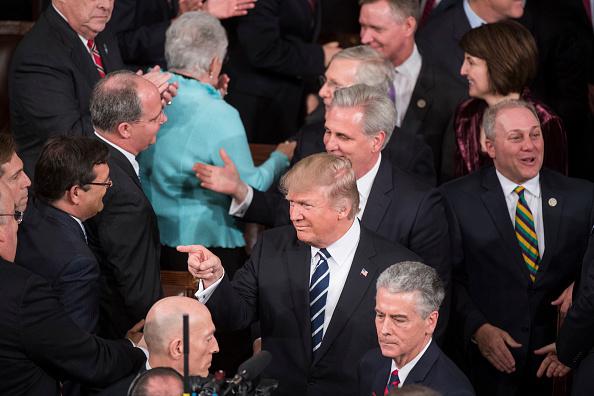The pundit consensus for Donald Trump’s first address to Congress was positive, even strong. “He became president of the United States in that moment, period,” said commentator Van Jones on CNN. Jones was referencing an extended ovation in honor of Carryn Owens, widow of Navy SEAL Ryan Owens, slain during a controversial anti-terrorism raid in Yemen. That raid had killed 25 civilians, including nine children, among them Nawar al-Awlaki, the 8-year-old daughter of Anwar al-Awlaki (killed in a 2011 drone strike ordered by President Obama) and an American citizen. Echoing Jones, Politico’s John Bresnahan praised that moment as “Reaganesque,” while Chris Cillizza of the Washington Post described the entire speech as “the best Trump has given since he entered politics way back in June 2015.”
It’s not that Trump gave a barnstormer or switched rhetorical gears; he offered the same message in much the same tone he used throughout the campaign, aided by the structure of the speech, which listed plans and accomplishments as extended bullet points in a fairly typical laundry-list approach. It’s more what Trump didn’t do. He didn’t insult his political opponents, or disparage the media, or indulge conspiracy theories. Instead, he delivered a lengthy speech without incident, with the usual presidential gestures toward national unity. It was Trump’s best speech, but only because he often benefits from what George W. Bush famously called the “soft bigotry of low expectations.”
But this focus on Trump’s style obscures the substance of his address, particularly the ways in which he continues to shape his administration around notions of racial threat where ordinary Americans face potential violence and destruction from an assortment of foreign others.
In the first part of his address, for instance, Trump told listeners that “we will soon begin the construction of a great, great wall along our southern border,” and described his recent immigration actions—which have targeted virtually every undocumented resident for deportation—as an effort to remove “gang members, drug dealers, and criminals.” The “bad ones are going out as I promised …. throughout the campaign,” he said. From there, he moved to his efforts to keep Muslims out of the United States, pledging “strong measures to protect our nation from radical Islamic terrorism” and tying foreign entry to the attacks in places like Boston and San Bernardino, despite the fact that none of the perpetrators in either incident would have been affected by Trump’s ban.
As we’ve seen over the past month, the White House’s overall aim has less to do with reducing terrorism and more with signaling official contempt for Islam. It helps explain why the administration has said little in support of those Muslim American citizens who have been detained and interrogated at airports, and why—in his address—Trump warned of a “beachhead of terrorism” inside the United States, all but framing Muslims as an inherent threat to American security.
The most egregious part of this message came later in the speech when Trump introduced some of his guests for the evening: several people who lost love ones to crimes committed by unauthorized immigrants. In Trump’s narrative, immigrants are a profound threat to public safety; a vector for crime and drugs, and a serious menace to law-abiding communities. In reality, unauthorized immigrants are no more likely to commit crime than their native-born counterparts, and there is no epidemic of violence from people who made illegal border crossings. Far from an act of compassion, Trump’s gambit sends a dangerous message: that unauthorized immigrants deserve the harsh treatment the administration plans to deliver. To bolster this, Trump announced his plan to create a new Department of Homeland Security office dedicated to publicizing immigrant crime. “We are providing a voice to those who have been ignored by our media, and silenced by special interests,” he said. Called Victims of Immigration Crime Engagement or VOICE, it is little more than an official smear campaign against immigrants meant to tar them as dangerous and undesirable.
Yes, as always, Trump promised jobs and prosperity. He spoke about his infrastructure bill and called on Congress to repeal and replace the Affordable Care Act, albeit without details or any real guidance. He performed the role of president, soaking in the pomp and circumstance like any veteran of reality television. But, also as always with Trump, one has to remember his primary focus. It was not jobs—for which, thus far, he’s only paid lip service—but attacks on those deemed foreign. It’s the most consistent part of his rhetoric, and it was part and parcel of his address to Congress. Strip everything else away—his camera-ready applause for Owens, his seemingly “presidential” bearing, even his opening nod to the shooting in Kansas and the threats to Jewish community centers around the country—and you have a core of ethno-nationalist antagonism in the service of right-wing populism and white identity politics. No amount of standing ovations will ever mask that.
